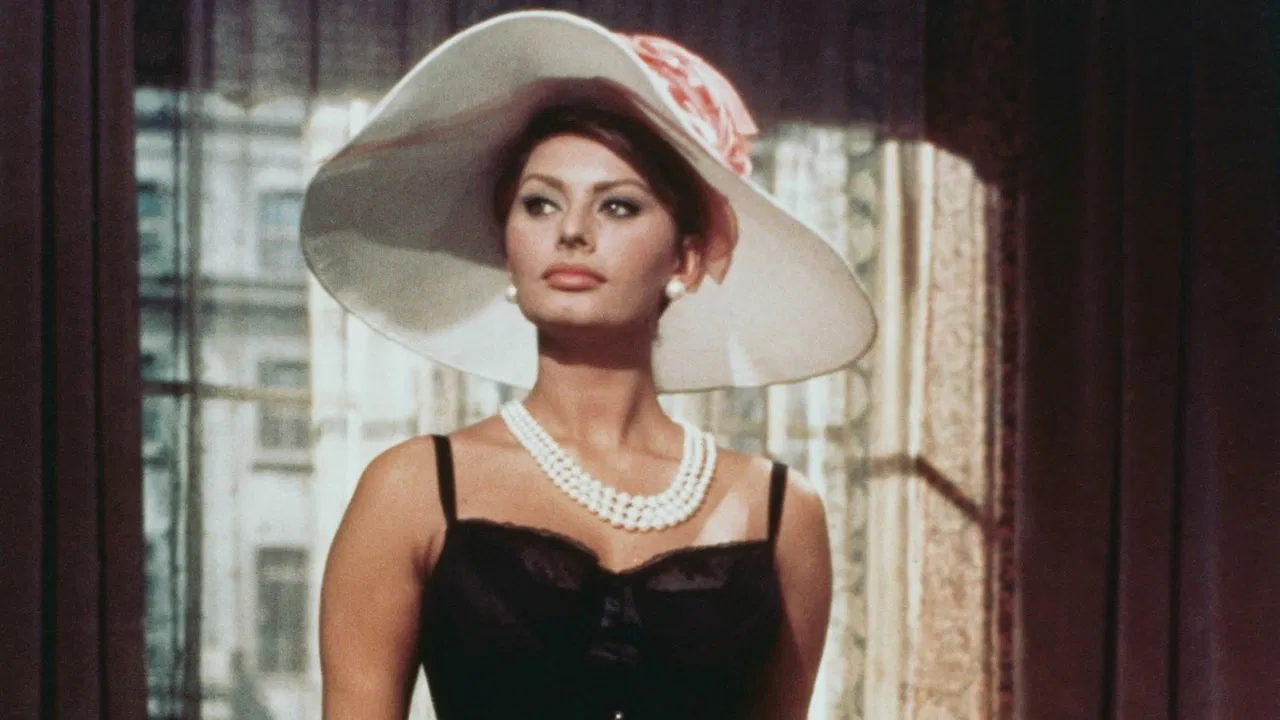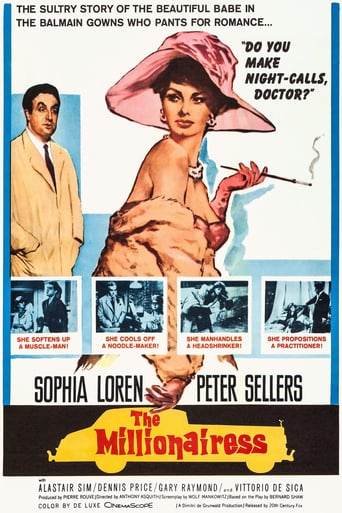

This is a better movie than I had expected. Peter Sellers did another uncannily dead on imitation of an accent, to go with his many imitations of accents from England and America, and he got to read some actual GBS lines, which was nice. There was more language from the George Bernard Shaw play than I had expected. Dennis Price and Alistair Sim offer nice comic support. I just wish they could have used an actress less concerned with how she looked and more interested in the language of the play.There are obvious flaws in this film. For starters, it suffers from extreme staginess. It's socialist message is not so much delivered but bludgeoned home. I give this film a pass because of the appealing performances by the film's leads, Peter Sellers and Sophia Loren. Sellers gives a terrific low-key turn as the sweet humanistic doctor. Loren is earthy yet manages to humanize the spoiled heiress she plays. As written, her character comes of as unappealing but Loren manages to engender empathy. Good supporting cast that includes Alistair Sim as Loren's barrister, Vittorio De Sica as a sweat shop owner, and Dennis Price as Loren's psychiatrist. Great film, great direction, great actors and actresses (Sofia Loren is amazingly beautiful, and no wonder why Sellers fell in love with her)!Overall rating: 7 out of 10.
... View More"The Millionairess", loosely based on a play by George Bernard Shaw, is a British romantic comedy about a romance between a wealthy Italian heiress and an Indian doctor. (I cannot imagine the Hollywood of the early sixties making a rom-com about that particular racial combination). The heroine is Epifania Parerga, has inherited a vast fortune from her father; the hero is Ahmed el Kabir, who runs a clinic for the poor in London's East End. The main idea is that Epifania falls hopelessly in love with Kabir even though their values are diametrically opposed; she is a ruthless capitalist, he is an unworldly and idealistic socialist. (When Shaw wrote his play in 1936, doctors who worked in the East End or other poor working-class areas generally were self-sacrificing idealists, but the film is set in the year it was made, 1960, by which time the introduction of the National Health Service meant that this was no longer the case).To win Epifania, Kabir has to satisfy the conditions of her eccentric father's will, namely that he must turn £500 into £15,000 within a three-month period. As he has absolutely no business acumen whatever, this seems a hopeless task. To win Kabir, Epifania has to comply with an equally eccentric condition laid down by his mother; she must prove that she can survive on only 35 shillings (£1.75 in modern currency) for three months. Rather surprisingly, she proves to be more than equal to this task.The film was a great success, both in Britain and internationally, at the time of its release, but today it is difficult to understand why. Today it comes across as horribly dated. Part of the reason is that Peter Sellers' characterisation of Kabir, complete with brown makeup and sing-song accent, seems patronising, almost borderline racist, but there is more to it than that. (At least the song Goodness Gracious Me" was omitted from the film). Quite apart from the racial aspects, this is not Sellers' greatest performance. He could be very good in parts where he had to adopt a foreign accent, notably Inspector Clouseau in the "Pink Panther" series and Dr Strangelove in the film of that name, but both Clouseau and Strangelove were, in their very different ways, inspired creations. Kabir is not. He is a wordy, tedious bore of the sort that crops up in Shaw's drama from time to time, less a rounded individual than a mouthpiece for a set of political opinions, about as funny as a two-hour speech at a TUC conference.Sophia Loren as Epifania is better, and she puts a lot of zest and energy into her characterisation. For all his own left-wing views, Shaw often couldn't help creating right-wing characters who were more interesting than his idealistic leftists, Andrew Undershaft in "Major Barbara" being another example, and with her zeal for capitalist enterprise Epifania comes across as a sexier, more glamorous version of the young Margaret Thatcher. There is, however, little chemistry between Loren and Sellers. Legend has it that Sellers fell hopelessly in love with the beautiful Italian on the set of this movie but that she- happily married to Carlo Ponti- failed to return his affections. If the legend is true, it would explain a lot.There are some decent performances in supporting roles from the likes of Alastair Sim, Dennis Price and Alfie Bass, but they do not compensate for the lack of interest generated by the central love story. Director Anthony Asquith had earlier directed a very good Shaw adaptation ("Pygmalion" from 1938), but "The Millionairess" is not in the same class. 5/10
... View MoreSophia Loren plays the only daughter of a wealthy Italian tycoon in London who dies and leaves his fortune to her; she's indifferent to the money and only wants love, but all her suitors are duds. Enter Peter Sellers as a doctor from India who treats the poor; he could use Sophia's money, but he's indifferent to her! Why the good doctor is uninterested in the woman is the weak link of the material, especially with Loren so glamorous. She even builds him his own state-of-the-art hospital, which of course he refuses. Sellers doesn't quite register as the saintly, don't-touch-me type, and his apprehension just stretches out this charade, but he is an interesting personality (especially when acting in a lower key). It's possible that Sophia's aggressive flirtations could scare doctor Peter away, but the deal they make here is a dull one, leading to a silly conclusion. Fine art direction, costumes and photography--and the leads make an intriguing movie-pair--but this George Bernard Shaw play is obviously not one of his better efforts. It collapses like a fancy but overworked soufflé. ** from ****
... View MoreThis is arguably Puffin Asquith's worst directorial effort by a country mile; it's true that his best days were behind him and the last thing guaranteed to revive a flagging talent and jaded appetite is a limp script like this and two leads with less on-screen chemistry than Bette Davis and Errol Flynn. Even as a freebie with an English newspaper it's honestly not worth the price of the newspaper - for the record the paper in question sponsors the London Film Festival and free copies are available at each screening which means that the movie cost me absolutely nothing and I still feel overcharged. We're not talking Golden but Platinum Turkey here. One to leave the country to avoid.
... View More